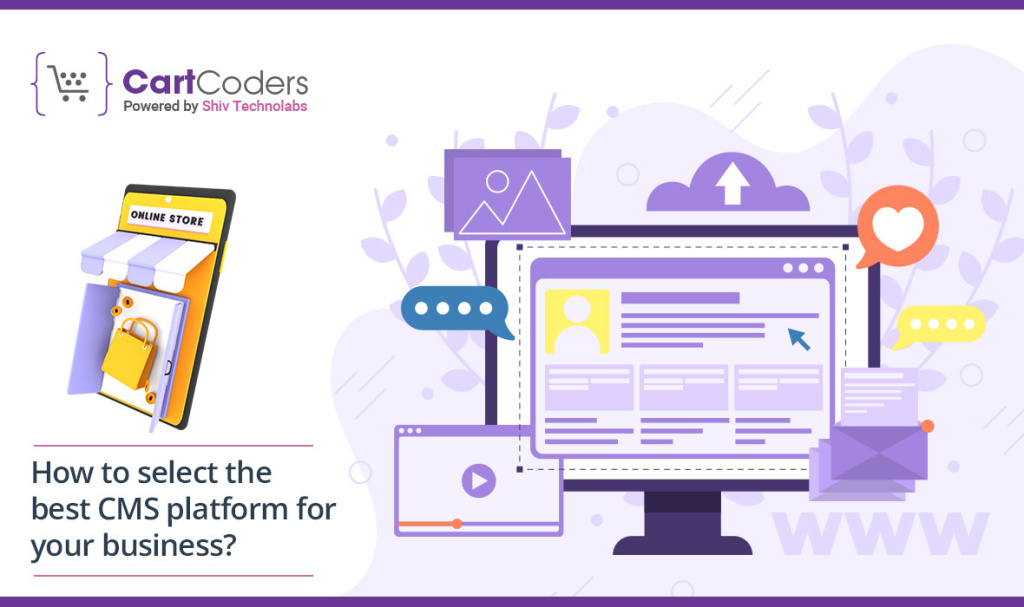The eCommerce landscape is undergoing rapid changes which are attributed to technological developments and changing consumer expectations. Choosing the right Content Management System (CMS) is important for businesses going online or seeking to update their digital shopfronts.
The right CMS not only acts as a support platform for an eCommerce business but also significantly affects its scalability, security features, and ability to leave a lasting impression. This blog will help you to choose the right CMS platform for your business and give you an overview of some top contenders in the market.
How to Select the Best CMS Platform for Your Business?

To be able to choose the most appropriate CMS, one needs to carefully consider some crucial factors:
- Scalability: A CMS should be able to scale with the growth of your organization. As the product range expands and the customer base grows, the platform should be able to scale up in terms of traffic and transactions without sacrificing speed and user experience. This will guarantee that your eCommerce store is effective and responsive even at times of peak traffic.
- Security: Due to the sensitive nature of customer data and transactions in eCommerce, selection of a CMS with powerful security features is the top priority. Find platforms that provide frequent updates, robust data encryption, secure payment gateways, and adherence to global security standards to avoid data breaches and cyber threats.
- Customization: Your CMS needs to be flexible to allow you to personalize your store’s appearance, behavior and functionality to match your brand and meet particular customer’s requirements. From theme adjustments to custom features added through code or plugins, the customization abilities may vary, enabling you to build a distinctive and captivating shopping experience.
- User experience: An intuitive and user-friendly admin interface greatly reduces the learning curve and operational inefficiencies. A CMS that provides a simple content management process, quick product uploads, and smooth integration with other tools can improve productivity and allow you to focus on growth strategies.
- Integration capabilities: The flexibility of the CMS to work with other third-party apps and services like payment gateways, shipping providers, and marketing tools is very important. These integrations not only enhance the working of your eCommerce store but also help to increase efficiency and customer satisfaction.
Best CMS Development Platforms for eCommerce

Shopify
Shopify powers 4.8 million websites in 175 countries. Being highly rated for its simplicity and all-inclusive features, Shopify is the go-to platform for many businesses. The ease with which users can set up and manage their online stores is one of the reasons behind its popularity.
Shopify’s flexibility is highlighted by its scalable architecture, huge theme library, and wide variety of apps. For those businesses looking for a personalized Shopify solution, working with a Shopify development company ensures a customized, brand-aligned storefront that is optimized for growth and conversion.
WooCommerce
WooCommerce integrates perfectly with WordPress, offering the ultimate flexibility for businesses that use content to generate sales. Developers can use plugins and themes for customization, making it a great choice for brands who want to create a distinct eCommerce presence.
Magento (Adobe Commerce)
Designed for medium to large businesses, Magento is a powerful platform that is well-known for its customization and scalability. Best suited for organizations with complex eCommerce requirements, Magento can handle large product catalogs and intricate discount strategies, although some amount of development expertise may be needed to deal with the complexities.
BigCommerce
BigCommerce is known for its scalability and the award-winning features it offers immediately out of the box. It helps accelerate business growth through powerful SEO features, multi-channel selling, and extensive integrations without the need for any customizations.
Wix
Wix makes it easy for startups and small businesses to focus on simplicity and aesthetics with its highly user-friendly interface. Its drag-and-drop interface simplifies the setup process but does not offer the same scalability as some other platforms do.
Squarespace
Squarespace is popular among creative professionals due to its design-oriented templates, which makes it perfect for small and medium-sized businesses that want to combine eCommerce features with storytelling. Despite the fact that it provides a user-friendly interface and powerful eCommerce tools, its scalability for larger businesses is not as good as platforms such as Shopify or Magento.
Conclusion
The right CMS for your online store depends on your business needs, technical capabilities, and growth plans. Shopify, with its user-friendly interface and scalable infrastructure, enhanced by professional Shopify store setup services provider like CartCoders, is a perfect choice for businesses looking for a combination of simplicity, customization, and scalability.
At the same time, platforms such as WooCommerce and Magento are preferred by those who need a lot of flexibility and control over their eCommerce setting. Regardless of the option you go for, a highly functional CMS will be the core of your online business that will support its success in a highly competitive digital marketplace of 2024.

